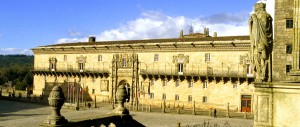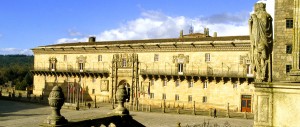The castles and monasteries downsize
January 17th, 2013 | Business
If you’ve ever visited Galicia, or any part of Spain for that matter, the chances are that you might have stayed in a Parador Hotel. What you might already know is that the group consists of more than 90 converted castles, monasteries and palaces dotted around the country – many are quite breathtaking, imposing buildings. The thing that you might not have realised is that the Parador group is owned and run by the Spanish Government, it’s entire workforce therefore being public sector workers.
I remember when I first arrived in Spain 10 or 11 years ago that the Parador hotels were not only very good, but more importantly they were very reasonably priced, and represented fantastic value for money. Since then however, prices have gradually increased, and by Spanish standards they now fall more into the luxury hotel price bracket. This factor, combined with Spain’s current economic woes, have conspired to bring the group to it’s knees, losing €72 million (USD 95.5 million) in 2011, with occupancy falling from 70% in 2011 to 52% in 2012 – losses for 2012 are expected to increase €107m (USD 142 million). The truth is that Paradores have not actually made any profit for years.
Government proposals to close several hotels inevitably resulted in strike action, meaning that many hotels were only able to offer reduced services to their guests (perhaps not the best way to endear themselves to loyal customers). As a result the Government eventually backed down, and will now only close one hotel. They will however, close around 30 hotels during the low season, shedding a few hundred jobs along the way, and also close at least 15 restaurants on a permanent basis. I should add that my own experience of Parador restaurants has been very mixed, ranging from some very good meals with excellent service, to some very poor food with indifferent service. Food was never really one of their fortes.
Apparently the Paradores, set up in 1926, were “not created purely to make money, but to showcase culturally rich, lesser visited parts of Spain”. It’s a real shame to say that they appear to have succeeded in at least one of their goals.
If you’ve ever visited Galicia, or any part of Spain for that matter, the chances are that you might have stayed in a Parador Hotel. What you might already know is that the group consists of more than 90 converted castles, monasteries and palaces dotted around the country – many are quite breathtaking, imposing buildings. The thing that you might not have realised is that the Parador group is owned and run by the Spanish Government, it’s entire workforce therefore being public sector workers.
I remember when I first arrived in Spain 10 or 11 years ago that the Parador hotels were not only very good, but more importantly they were very reasonably priced, and represented fantastic value for money. Since then however, prices have gradually increased, and by Spanish standards they now fall more into the luxury hotel price bracket. This factor, combined with Spain’s current economic woes, have conspired to bring the group to it’s knees, losing €72 million (USD 95.5 million) in 2011, with occupancy falling from 70% in 2011 to 52% in 2012 – losses for 2012 are expected to increase €107m (USD 142 million). The truth is that Paradores have not actually made any profit for years.
Government proposals to close several hotels inevitably resulted in strike action, meaning that many hotels were only able to offer reduced services to their guests (perhaps not the best way to endear themselves to loyal customers). As a result the Government eventually backed down, and will now only close one hotel. They will however, close around 30 hotels during the low season, shedding a few hundred jobs along the way, and also close at least 15 restaurants on a permanent basis. I should add that my own experience of Parador restaurants has been very mixed, ranging from some very good meals with excellent service, to some very poor food with indifferent service. Food was never really one of their fortes.
Apparently the Paradores, set up in 1926, were “not created purely to make money, but to showcase culturally rich, lesser visited parts of Spain”. It’s a real shame to say that they appear to have succeeded in at least one of their goals.




